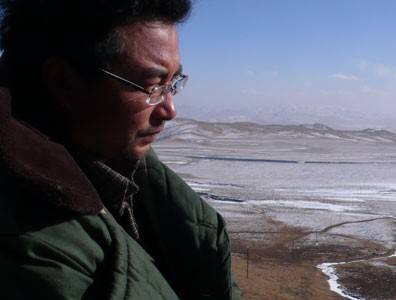 I’ll begin by saying that this article is fantastic. It has an interview with Director Pema Tseden (pictured right) and a lot of information that I did not know at the time I viewed The Search.
I’ll begin by saying that this article is fantastic. It has an interview with Director Pema Tseden (pictured right) and a lot of information that I did not know at the time I viewed The Search.
That being said, there’s a lot more to the movie than what the article’s author discusses, so I’m going to speak more about the story than about Tseden’s interesting background (he’s the son of Tibetan nomads), and the fact that this is the first “Chinese movie by a Tibetan director with a Tibetan crew” (as mentioned in the article).
The Search, for the first hour, made me wonder what I was actually watching. It’s not a mockumentary, but there’s no way that there would happen to be a camera-person filming the “real” camera-person and crew as they travel around Tibet, trying to recruit country and city dwellers into participating in a film version of a now out-of-style opera: the story of Prince Drime Kunden. So about an hour in, (if you are me) you think about it and realize that there must be a fictional story going on, and not just an accidental film (which, at the end, this is all revealed to be. Though it isn’t.)
There are about four different storylines occurring throughout the film. The first, and most obvious, is where the title originates ― which is that the Director (not the “actual” director) is looking for people to reenact this outdated cultural icon. This, by itself, would make for a very boring documentary.
The second storyline features a girl who played the female lead in the opera. She’s trying to find her ex-boyfriend, who dumped her when he went off to the big city. Throughout the movie, people try to see her face, and the viewer wonders what will happen when this Jerry Springer-esque confrontation occurs.

The third storyline is a love story told in many parts by “the Businessman” in the car along the drive. The fourth is the story of the Director, who continues to receive phone calls from his family along the drive.
There are quite a few interesting subtleties in this movie, one being the fact that the audience never knows anyone’s name (it’s very Chaucer, employing only roles such as the Businessman and the Director). The jury at the Shanghai International Film Festival were very, very correct to say that this movie is a challenge, “almost a meditation in patience and an exercise in it.”
The Search could be considered boring except for how rewarding it is by the end, as all of the storylines (in a way) culminate. This culmination, however, is not manufactured in a spectacular fashion; rather, there are long static shots, where you see something from far away, and you can tell that you are an outsider, following on a journey. Which, let’s face it, we are.
 I will also say, from purely my own standpoint, that the drunken buffoon in the bar asks a lot of questions that I would ask ― namely, why the hell the righteous Prince was able to give away something that was not his to give (his wife and kids). The fact that the issue is brought up by the buffoon, as well as a (kind of weird) hermit towards the beginning of the movie, is perhaps a questioning by the director of how “righteous” this mythical figure really is.
I will also say, from purely my own standpoint, that the drunken buffoon in the bar asks a lot of questions that I would ask ― namely, why the hell the righteous Prince was able to give away something that was not his to give (his wife and kids). The fact that the issue is brought up by the buffoon, as well as a (kind of weird) hermit towards the beginning of the movie, is perhaps a questioning by the director of how “righteous” this mythical figure really is.
At film’s end, the viewer is left with having seen a country and its people from the point of view of a native who is trying to portray his country in a way that no outsider could. I got the same feeling from Munyurangabo, when I saw it for Ebertfest, and even if you don’t love the slower pace of a movie and a culture, there’s something satisfying about not getting talked down to throughout a movie either, and being forced to see it through someone else’s eyes.
I really enjoyed this film, and if you’re in the mood to be patient and experience someone else’s culture (without any explosions), you might too.








